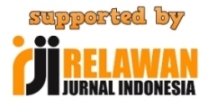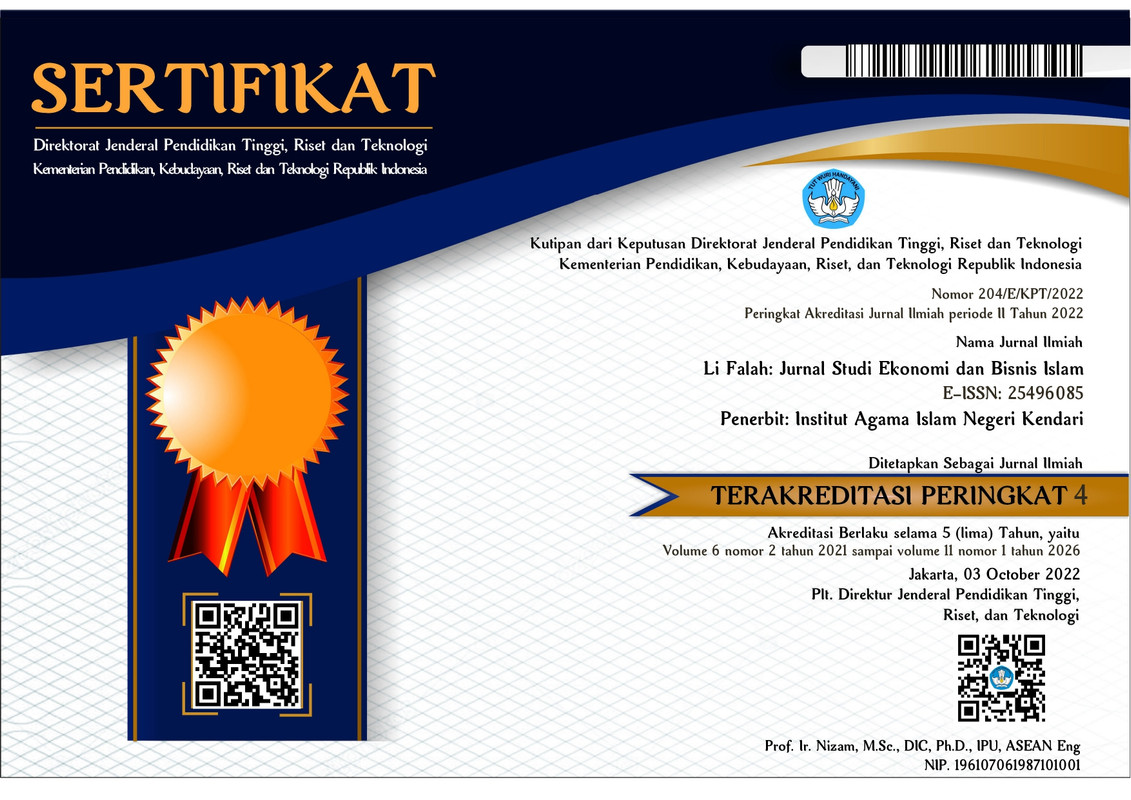Sustainable Development Goals through Productive Fisheries Waqf
Abstract
Keywords
Full Text:
PDFReferences
Ahmad, I. U. (1992). Islam and the Economic Challenge. In American Journal of Islam and Society (Vol. 9). https://doi.org/10.35632/ajis.v9i4.2540
Al-Anzi, E., & Al-Duaij, N. (2004). Islamic Waqf and Environmental Protection. Codicillus, 45(2), 52–63.
Ali, K. M., & Kassim, S. (2020). Waqf Forest: How Waqf Can Play a Role In Forest Preservation and SDGs Achievement? Etikonomi, 19(2), 349–364. https://doi.org/10.15408/etk.v19i2.16310
Anggreni, K., Suparta, N. S., & Astiti, N. W. S. (2015). Peranan Koperasi Baruna sebagai Lembaga Ekonomi Pengembangan Pesisir (LEPP) dalam Peningkatan Kesejahteraan Nelayan di Kawasan Minapolitan …. Jurnal Manajemen Agribisnis, 3(1), 14–21. Retrieved from https://ocs.unud.ac.id/index.php/agribisnis/article/view/17086
Ascarya, Rahmawati, S., & Sukmana, R. (2017). Cash Waqf and Islamic Microfinance Institutions: Business Models in Indonesia. 2nd Islamic Finance, Banking & Business Ethics Global Conference 2017. Kuala Lumpur, Malaysia: INCEIF.
Azganin, H., Kassim, S., & Auwal Adam, S. (2021). Proposed waqf crowdfunding models for small farmers and the required parameters for their application. Islamic Economic Studies, 29(1), 2–17. https://doi.org/10.1108/IES-01-2021-0006
Badan Pusat Statistik. (2020). Statistik Sumber Daya Laut Dan Pesisir 2020. Badan Pusat Statistik. Jakarta: Badan Pusat Statistik Indonesia.
Badan Wakaf Indonesia. (2019). Buku Pintar Wakaf. Jakarta Timur: Badan Wakaf Indonesia.
Berakon, I., Aji, H. M., & Hafizi, M. R. (2021). Impact of digital Sharia banking systems on cash-waqf among Indonesian Muslim youth. Journal of Islamic Marketing. https://doi.org/10.1108/JIMA-11-2020-0337
Bilal Khan, M., Ahmad Ghafoorzai, S., Patel, I., & Mohammed Shehbaz, D. (2021). Waqf based Islamic Fintech Model for Agriculture Sector of Indonesia. International Journal of Business Ethics and Governance, (February), 73–85. https://doi.org/10.51325/ijbeg.v4i1.61
Charities Aid Foundation. (2019). CAF World Giving Index 10th Edition. Retrieved from https://www.cafonline.org/about-us/publications/2019-publications/caf-world-giving-index-10th-edition
Departemen Agama. (2007). Undang-Undang Nomor 41 Tahun 2004 Tentang Wakaf & Peraturan Pemerintah Nomor 42 Tahun 2006 Tentang Pelaksanaan Undang-Undang Nomor 41 Tahun 2004 Tentang Wakaf. Jakarta: Direktorat Jenderal Bimbingan Masyarakat Islam.
FAO. (2018). The State of World Fisheries and Aquaculture 2018. Rome. Retrieved from https://creativecommons.org/licenses/by-nc-sa/3.0/igo
Farikhatusholikhah, Novianti, T., & Ali, K. M. (2018). Implementation of the Zakat Village Index to Support a Zakat Community Development Program in Bedono Village, Demak District. International Journal of Zakat, 3(3), 25–38.
Global Wakaf-ACT. (2016). Tentang Kami - Global Wakaf. Retrieved October 26, 2021, from globalwakaf.com website: https://www.globalwakaf.com/id/tentang_kami
Goso, Suhardi, & Anwar, M. (2017). Kemiskinan Nelayan Tradisional Serta Dampaknya Terhadap Perkembangan Kumuh. Jurnal Manajemen STIE Muhammadiyah Palopo, 3(1), 25–37. https://doi.org/10.35906/jm001.v3i1.201
Haneef, M. A., Pramanik, A. H., Mohammed, M. O., Bin Amin, M. F., & Muhammad, A. D. (2015). Integration of waqf-Islamic microfinance model for poverty reduction: the case of Bangladesh. International Journal of Islamic and Middle Eastern Finance and Management, 8(2), 246–270.
Hosomi, R., Yoshida, M., & Fukunaga, K. (2012). Seafood consumption and components for health. Global Journal of Health Science, 4(3), 72–86. https://doi.org/10.5539/gjhs.v4n3p72
Kahf, M. (2003). The Role of Waqf In Improving The Ummah Welfare. The International Seminar on “Waqf as a Private Legal Body,” 1–26. Retrieved from http://monzer.kahf.com/papers/english/ROLE_OF_WAQF_IN_THE_WELFARE_OF_THE_UMMAH.pdf
Katila, P., de Jong, W., Galloway, G., Pokorny, B., & Pacheco, P. (2017). Building on Synergies: Harnessing Community and Smallholder Forestry for Sustainable Development Goals.
Kusuma, D., Setiawina, I. N. D., & Utama, I. M. S. (2018). Analisis Faktor-Faktor Yang Mempengaruhi Kesejahteraan Nelayan Di Kabupaten Jembrana. E-Jurnal Ekonomi Dan Bisnis Universitas Udayana, 23(2), 2437. https://doi.org/10.24843/eeb.2018.v07.i11.p05
McManus A, & W, N. (2011). Seafood, nutrition and human health: A synopsis of the nutritional benefits of consuming seafood. Perth: Centre of Excellence Science, Seafood & Health, Curtin Health Innovation Research Institute.
Miles, M. B., Huberman, A. M., & Saldana, J. (2014). Qualitative Data Analysis: A Methods Sourcebook (Third Edit; H. Salmon, Ed.). United States: SAGE Publications, Inc.
Mohamed, M. I., & Shafiai, M. H. M. (2021). Islamic Agricultural Economic Financing Based On Zakat, Infaq, Alms And Waqf In Empowering The Farming Community. IQTISHADUNA: Jurnal Ilmiah Ekonomi Kita, 10(1), 144–161. https://doi.org/10.46367/iqtishaduna.v10i1.334
Pitchay, A. A., Meera, A. K. M., & Saleem, M. Y. (2014). Priority of Waqf Development among Malaysian Cash Waqf Donors: An AHP Approach. Journal of Islamic Finance, 3(1), 13–22.
PUSDATIN-KKP. (2018). Buku Pintar Kelautan dan Perikanan. Jakarta: Pusat Data, Statistik, dan Informasi. Retrieved from http://sidatik.kkp.go.id/files/src/9b51341263445211c37f801ac8458a4c.pdf
Razak, S. H. A. (2020). Zakat and waqf as instrument of Islamic wealth in poverty alleviation and redistribution: Case of Malaysia. International Journal of Sociology and Social Policy, 40(3–4), 249–266. https://doi.org/10.1108/IJSSP-11-2018-0208
Sargeant, J. (2012). Qualitative Research Part II: Participants, Analysis, and Quality Assurance. Journal of Graduate Medical Education, 4(1), 1–3. https://doi.org/10.4300/jgme-d-11-00307.1
Sarwat, A. (2018). Fiqih Waqaf. Jakarta Selatan: Rumah Fiqih Publishing.
Seymour, F., & Busch, J. (2017). Forests and SDGs: Taking a Second Look. Retrieved October 26, 2021, from World Resources Institute website: https://www.wri.org/blog/2017/09/forests-and-sdgs-taking- second-look
Shafii, Z., Iqbal, Z., & Tasdemir, M. (2015). Governance Regulatory Framework for Waqf in Selected Countries. Borsa Istanbul Reitpaa Mahalles.
Shaikh, S. A., Ismail, A. G., & Shafiai, M. H. M. (2017). Application of Waqf for Social and Development Finance. ISRA International Journal of Islamic Finance, 9(1), 5–14.
Singarimbun, M., & Effendi, S. (2011). Metode Penelitian Survai. Jakarta: LP3S.
Sugara, Hamdani, I., & Tanjung, H. (2019). Strategi Pengembangan Wakaf Tunai Pada Global Wakaf. KASABA:Jurnal Ekonomi ISlam, 12(2), 81–90.
Sukmana, R, Setianto, R. H., Premananto, G. C., & Ajija, S. R. (2020). Aplikasi Blockchain Berbasis Crowdfunding Wakaf Di Grup Nelayan: Studi Kasus Nambangan dan Cumpat, Surabaya. Journal of Community Service and Engagements, 02, 26–29.
Sukmana, Raditya. (2020). Critical assessment of Islamic endowment funds (Waqf) literature: lesson for government and future directions. Heliyon, 6(10), e05074. https://doi.org/10.1016/j.heliyon.2020.e05074
Thaker, M. A. M. T., Mohammed, M. O., Duasa, J., & Abdullah, M. A. (2016). Developing cash waqf model as an alternative source of financing for micro enterprises in Malaysia. Journal of Islamic Accounting and Business Research, 7(4), 254–267.
Toppe, J. (2016). Which Fish to Eat: Enjoying the Benefits While Minimizing the Risks. Procedia Food Science, 6(Icsusl 2015), 47–50. https://doi.org/10.1016/j.profoo.2016.02.009
Umar, U. H., Baita, A. J., Haron, M. H. Bin, & Kabiru, S. H. K. (2021). The potential of Islamic social finance to alleviate poverty in the era of COVID-19: the moderating effect of ethical orientation. International Journal of Islamic and Middle Eastern Finance and Management, ahead-of-p(ahead-of-print). https://doi.org/10.1108/imefm-07-2020-0371
UNWTO. (2018). Tourism and the Sustainable Development Goals – Good Practices in the Americas. Retrieved from The World Tourism Organization website: https://doi.org/10.18111/9789284419685
Wafi, H., Yonvitner, Y., & Yulianto, G. (2019). Pendapatan Dan Kesejahteraan Nelayan Dari Sistem Bagi Hasil di Selat Sunda. Journal of Tropical Fisheries Management, 3(2), 1–8. Retrieved from https://jurnal.ipb.ac.id/index.php/jurnalppt/article/view/30164
Wahyuni, S., & Kusumaningrum, S. I. (2020). Jatsiyah Financing System : Fintech Berbasis Waqaf-Crowdfunding untukTercapainya Kemaslahatan Nelayan ABK. Dinar : Jurnal Ekonomi Dan Keuangan Islam, 6(1), 38–53. https://doi.org/10.21107/dinar.v6i1.6469
Yunita, P. (2020). Cash Waqf Linked Sukuk (CWLS) Model: For Indonesia Sustainable Food Security. AL-AWQAF: Jurnal Wakaf Dan Ekonomi Islam, 13(1), 39–58.
DOI: http://dx.doi.org/10.31332/lifalah.v7i1.3952
Copyright (c) 2022 Putri Rizka Citaningati

This work is licensed under a Creative Commons Attribution-ShareAlike 4.0 International License.
Li Falah : Jurnal Studi Ekonomi dan Bisnis Islam, Indexed In
Accredited By
View My Stats
Organized by : Fakultas Ekonomi dan Bisnis Islam
Published by : Institut Agama Islam Negeri Kendari
Jl. Sultan Qaimuddin No. 17 Baruga Kota Kendari Provinsi Sulawesi Tenggara
phone. +62401-3193710
Fax. +62401-3193710
Email: [email protected]



















